Salayhandmade Milestones
2010 |
Salayhandmade penetrates another mainstream market in France through Fair 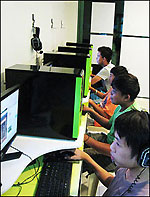 Trade partner, Signalethique. Trade partner, Signalethique.
Salayhandmade gains access to the only reliable internet connection in Salay from PLDT and subsequently opened the 12-unit Highway Internet Café, the first in the town.
Salayhandmade is granted permission to use the World Fair Trade Organization logo. |
2009 |
Salayhandmade partners with APFTI and converts the Salayhandmade showroom to a Fair Trade Shop, the second to open in the Philippines. The store brings Fair Trade products from other regions of the country to the public with the tag line: Don’t just buy, buy just!
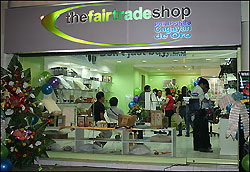 The 2009 Vision/Mission is formulated to reflect its main objective of becoming a sustainable business. The 2009 Vision/Mission is formulated to reflect its main objective of becoming a sustainable business.
SHAPII Employees Multipurpose Cooperative receives a P300,000 grant from the Department of Labor and Employment to augment worker’s income through a piggery project.
Salayhandmade hosts Erin Yokel and Paul Yee of Erisa production, NY, USA. During their 3-week stay in Salay, they documented fair trade practice as part of a documentary project called Crafting Hope, which will hopefully come out in 2 years’ time. |
2008 |
Salayhandmade builds its own fumigation chamber, alongside a few other machineries to increase production capacity.
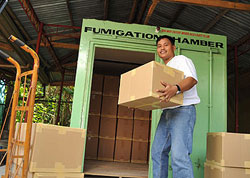 Salayhandmade is threatened by the global financial crisis. Appeals to understanding and for survival were discussed in many meetings between management and workers, which resulted in a strengthened organization. Salayhandmade is threatened by the global financial crisis. Appeals to understanding and for survival were discussed in many meetings between management and workers, which resulted in a strengthened organization.
Salayhandmade President Loreta Rafisura travels to Akron, Pennsylvania to grace the Ten Thousand Villages US Workshop. As guest speaker, She introduced Salayhandmade to the 400 delegates from all over the US.
Salayhandmade President Loreta Rafisura becomes the first woman director of WFTO-Asia, elected in the WFTO-Asia Conference in Sri Lanka. |
2007 |
Salayhandmade President Loreta Rafisura presents the Salayhandmade story in Traidcraft, UK and visits Marks and Spencer, Salayhandmade’s second biggest mainstream client. With the help of Fair Trade partner Traidcraft, Salayhandmade pioneered as one of the 2 first fair traders to supply its Stationery Section.
Salayhandmade finally gets internet connection (though still slow and intermittent). |
2006 |
Salayhandmade puts in place its Environmental Management System.
Salayhandmade shifts its paper material base from cogon grass to abaca, because of its big recovery rate and commercial accessibility.
Salayhandmade formalizes its Human Resource Management team, whose first move was to allow artisans to become home-based workers instead of having to come to company grounds.
Salayhandmade President Loreta Rafisura is elected President of Philexport Region X. |
2005 |
The Salayhandmade flag is created and flown for the first time from the main office building in Salay.
The Salayhandmade Paper Showroom/Liaison Office transfers to De Leon Plaza, at Velez corner Yacapin Streets.
Salayhandmade completes its Waste Water Treatment Facilities with a US$6000 grant from Ten Thousand Villages, Canada. This helps them comply with the environmental standards of the Department of Environment and Natural Resources (DENR).
SHAPII Foundation institutes the “Most Distinguished Salayano Award” to raise self-esteem among people of the community. The award is given every 3 years. |
2004 |
Salayhandmade steps up its Mechanization Program for the paper making department through a loan from Shared Interest, a UK financial Fair Trade facility.
Salayhandmade feels it had accomplished its original Vision/Mission, and with the help of a National Economic Development Authority (NEDA) strategic planning team, formulates its second Vision/Mission, incorporating more Fair Trade principles.
To assure uninterrupted production, Salayhandmade installs a 90kva generator.
Salayhandmade penetrates Barnes and Nobles, USA through indirect export with Phildansk. This breakthrough in the mainstream market allows more than 400 workers to be trained and get involved in production!
SHAPII Foundation congratulates their first 4 college graduates. |
2003 |
After a two-year wait, Salayhandmade is accepted as a member of the UK-based International Fair Trade Organization.
Salayhandmade gains access to telephone services, and feels like the deaf hearing for the first time! They also start using mobile phones, and this new connectivity makes business easier and better.
Salayhandmade produces the maiden issue of SHAPIINEWS, a tool for transparency and record-keeping. These are sent to stakeholders and distributed to all stockholders, stakeholders and workers.
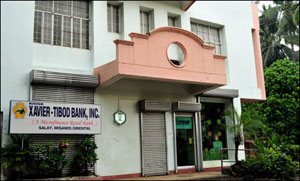 Salayhandmade invests some of its earnings to comprise 1/5 of the original capital of Xavier Tibod Rural Bank, a microfinance bank in Salay, Misamis Oriental. XTBI is initiated by the Milamdec Foundation of Xavier University, Cagayan de Oro. XTBI becomes the payroll disbursement facility of Salayhandmade. Salayhandmade invests some of its earnings to comprise 1/5 of the original capital of Xavier Tibod Rural Bank, a microfinance bank in Salay, Misamis Oriental. XTBI is initiated by the Milamdec Foundation of Xavier University, Cagayan de Oro. XTBI becomes the payroll disbursement facility of Salayhandmade.
A 2-storey building is constructed at the frontage of the Green House (the production area) to accommodate the Administrative Department of Salayhandmade. The building also houses its retail showroom in Salay, as well as the XTBI.
The vacated office building in El Progreso Salayano becomes the main headquarters of SHAPII Foundation.
Concurrently, the Salayhandmade showroom/retail shop and liaison office in Cagayan de Oro moves to Pabayo Street. |
2001 |
Salayhandmade’s Neil Rafisura and Noel Capistrano go to the Kumarrappa National Handmade Papermaking Institute in Jaipur, India for a month-training in papermaking.
Salayhandmade establishes its first Showroom and Liaison Office in Cagayan de Oro, using 2 rooms of the newly-built residence of Dr. Reynaldo and Loreta Rafisura in NHA, Kauswagan.
|
2000 |
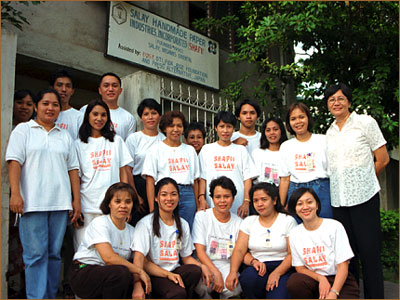 The SHAPII Employees Multipurpose Cooperative is registered with the Cooperative Development Authority, with 136 member-employees. The SHAPII Employees Multipurpose Cooperative is registered with the Cooperative Development Authority, with 136 member-employees.
The Salay Handmade Paper Industries Foundation Inc. (SHAPII Foundation) is registered. The 48 Salayhandmade stockholders becomes the foundation stakeholders.
Chairman of the Board Dr. Reynaldo Rafisura and Salayhandmade President Loreta Rafisura visits the Kumarrappa National Handmade Papermaking Institute in Jaipur, India. Dr. Rafisura is finally convinced that handmade papermaking could be a business and viable craft activity for the people. |
1999 |
Salayhandmade establishes the “Alay Sa Bata” Grant –Aid Scholarship Program for 4 bright but economically challenged Salayano youth. This became the forerunner of the SHAPII Foundation thrust.
Salayhandmade President Loreta Rafisura is named alongside 254 Filipino Centennial awardees of the Philippines. This is compiled in a book by the National Commission – Women Sector, in the Industry, Trade and Tourism division. |
1998 |
Neil Rafisura joins a one-month Marketing and Global Technology Search in Europe thru a grant from the DOST (Department of Science and Technology), APFTI (Advocate of Philippine Fair Trade Partners, Inc.), and TraidCraft Exchange, UK.
Salayhandmade sends two of its staff for computer training at SIAM Foundation, Cagayan de Oro City. They then trained, by batches, all the workers of Salayhandmade, in order to facilitate computerization in the workplace. |
1997 |
Neil Rafisura goes to the Netherlands, courtesy of Philexport and CBI, for a 2-week training in Marketing. |
1995 |
Salayhandmade wins the Most Environmental Livelihood Project in the Philippines Award from Rizal Commercial Banking Corporation (RCBC) and receives a P100,000 check. Every cent of this prize went to buying a lot and construction to house the new production area, which is naturally called “The Green House.”
The Rural Bank of Talisayan organizes the “Sunshine Group,” an independent self -help group for Salayhandmade workers. |
1994 |
With the help of the Department of Science and Technology’s IMPEX Program, Salayhandmade improves its workplace flow and systems. This led to the establishment of the SHAPII Printshoppe - to make forms and other documents necessary for the operation of the business in the rural area. This became the forerunner of the Digital Services, a key section in Salayhandmade whose services is open to the community. |
1991 |
Salayhandmade receives a P240,000 grant from the Press Alternative of Japan, the first Fair Trader partner of Salayhandmade. The money is spent for the mechanization of the production. (Ten years later, this grant would be followed by a donation of a secondhand Hollander beater.)
With the help of a P200,000 capital investment loan from RISE Foundation, Salayhandmade constructs a 2-storey building in El Progreso Salayano street. Once paid, all of RISE Foundation’s staff joined Salayhandmade as stockholders – from their manager to janitor, and were warmly welcomed to the Salayhandmade family.
start of the marketing of
Mr Joseph and Mrs lita Lee and their son Paul of Parkwood Products in 4 SM
malls in Manila and started to introduce Salayhandmade products to the
market in the Philippines.
The children of Dr Reynaldo and Loreta Rafisura, Neil, Loreen, and J. Emmanuel, finishes college and one by one came to help in the business. |
1990 |
With an initial capitalization of P9,000, Salayhandmade is registered as Salay Handmade Paper Industries, Inc. with the Securities and Exchange Commission (SEC), formally separating from the Salay People’s Economic Council.
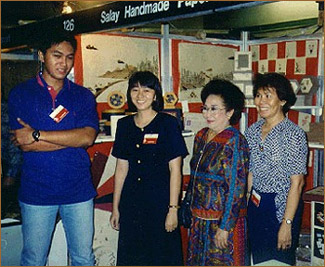 Loreta Rafisura and Loreta Saraos visits the Press Alternative of Tokyo, Japan for 9 days on invitation, and tours many handmade paper companies where they are inspired by the exquisite handmade paper products of Japan and its Third World Shops. Loreta Rafisura and Loreta Saraos visits the Press Alternative of Tokyo, Japan for 9 days on invitation, and tours many handmade paper companies where they are inspired by the exquisite handmade paper products of Japan and its Third World Shops.
Salayhandmade products are marketed in Manila by Parkwood Products, a company owned by Joseph and Lita Lee, relatives of the Rafisuras. Their son Paul exerts every effort to sell Salayhandmade products on consignment basis in the SM Malls in Manila.
Salayhandmade ventures into exporting for the first time through Mr. Larry Turner of the USA, despite having no telecommunication facility in Salay! |
1989 |
Salayhandmade joins its first trade fair, the Mindanao Trade Expo in Davao, and realizes the potentials of the new “sunrise industry” of the Philippines. The booth is mobbed by both artists and environmentalists.
Salayhandmade institutionalizes the three o’clock prayer to the Divine Mercy, as all workers gather together voluntarily to pray for a few minutes every working day before the afternoon break. |
1987 |
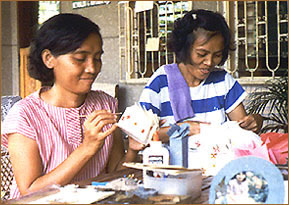 With an initial capital of P6,000 (raised from a prior raffle draw), and a lot of help and encouragement from the Department of Trade and Industry, Salayhandmade production starts humbly in an abandoned chicken house just a stone’s throw from the home of Dr. Reynaldo and Mrs. Loreta Rafisura, as the Industry Sector of Salay People’s Economic Council. With an initial capital of P6,000 (raised from a prior raffle draw), and a lot of help and encouragement from the Department of Trade and Industry, Salayhandmade production starts humbly in an abandoned chicken house just a stone’s throw from the home of Dr. Reynaldo and Mrs. Loreta Rafisura, as the Industry Sector of Salay People’s Economic Council.
|
|
|
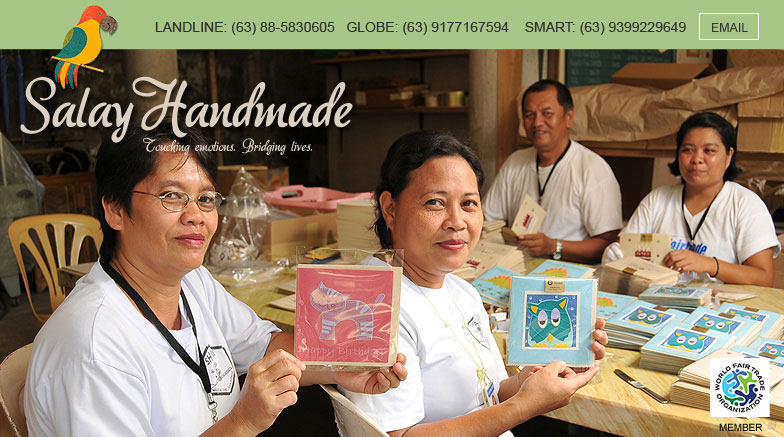
![]()